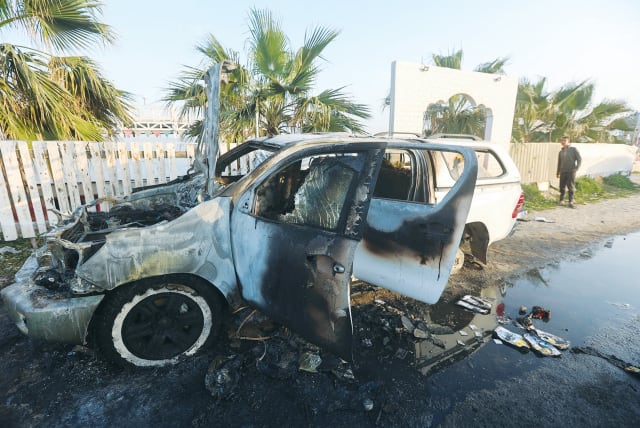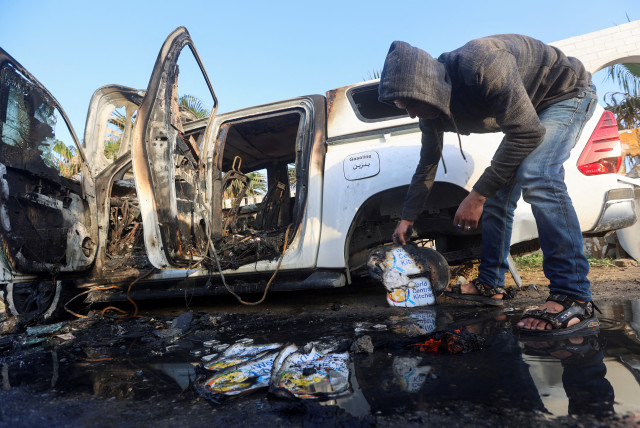Deaths of WCK humanitarians highlight role of security coordinators - analysis

Gaza convoy strike killed three UK former military service members who were working as part of the security team of the World Central Kitchen humanitarian organization.
On April 1, Israel Defense Forces airstrikes on three vehicles in a humanitarian convoy of the World Central Kitchen in Gaza led to the deaths of seven humanitarian aid workers.
In the wake of the tragedy, its CEO Erin Gore said that “these are the heroes of WCK. These seven beautiful souls were killed by the IDF in a strike as they were returning from a full day’s mission. Their smiles, laughter, and voices are forever embedded in our memories.”
Three of those killed in the airstrike were members of the WCK security team, who were military veterans. This sheds light on the important work that security coordinators have in working with NGOs and also other organizations.
According to reports in UK media, the three members of the security team included John Chapman (57), James Henderson (33) and James Kirby (47). All of them were from the UK.
In a statement by James Kirby’s family at the BBC, they said “James understood the dangers of venturing into Gaza, drawing from his experiences in the British Armed Forces, where he bravely served tours in Bosnia and Afghanistan. Despite the risks, his compassionate nature drove him to offer assistance.”
Kirby was born in Bristol and had served in the army, including in Afghanistan in 2011. Chapman was born in Aylesbury and was a former Special Forces soldier in the Special Boat Service. Later he worked in private security work in the Gulf, according to a remembrance at the Daily Mail. Henderson was from Cornwall and had served in the Royal Marines for six years before moving to security work in 2016. Kirby’s LinkedIn profile said he was an SIA-licensed close protection officer with experience in “executive protection, hostile and covert surveillance, security management and maritime security.”
The three men all worked for a security company called Solace Global, according to a Channel 4 report in the UK. Solace Global’s non-executive director Matthew Harding told the channel that “the impact on operations is that we will clearly and have clearly taken a very close look at all of our planning, risk control measures and our activities up to, during and after the event. I think the majority of people working in this industry are either ex-military or ex-law enforcement and have a lifetime of experience of operating in this kind of environment before they embark on this type of career.”
The BBC noted that “the men had been in Gaza for just over a week because the firm regularly rotates its staff. They were due to return home in days, the BBC understands. The men’s roles as security advisers were to ensure the convoy followed its safety procedures and remained on the correct route.”
World Central Kitchen (WCK) founder José Andrés said that “the airstrikes on our convoy: I don’t think [they] were an unfortunate mistake. It was really a direct attack on clearly marked vehicles whose movements were known by everybody at the IDF.”
BBC notes that the workers had been in Gaza for a short time
A BBC article on the airstrike noted that there wasn’t a problem with the information relayed to the IDF about the convoy’s movements on the night in question. Gaza is a complex place and driving between areas held by the IDF and areas held by Hamas is fraught with dangers.
The IDF now controls a corridor across Gaza which essentially cuts off Gaza city from Central Gaza, enabling the IDF to move more easily across the Strip and neutralize threats. This corridor, called Netzarim, begins in Israel and ends at the sea where there is a new pier the military has built. It was on that pier that a WCK barge with food was docked so that hundreds of tons of aid could be offloaded, the second time the organization had done this. Around 100 tonnes had been offloaded of the 240 tonnes on the ship.
I REACHED out to two security professionals who are familiar with the kind of work the security team was doing with WCK. An ex-British military security adviser described how when he did similar work, the professionals would have liasoned with the Coordination of Government Activities in the Territories (COGAT), who would provide the grid references they were traveling through.
The security team with WCK had three men and likely that meant one in each of the vehicles. The convoy that left the pier where the IDF was present included a number of trucks and three cars; the cars had the WCK workers in them. Somewhere along the route, an armed suspect boarded one of the trucks.
The team would have done a threat assessment about the route they were traveling on. The men had backgrounds in the military, but Gaza is not the same as Afghanistan and the complex environment and the ever-changing conflict in the Strip poses unique challenges. It would have been important for the men to have a liason with the IDF and also be able to speak directly with the brigade in whose sector they were operating.
This could be the Nahal Brigade in central Gaza, or the southern brigade of the Gaza division. The security adviser I spoke to said that when he went into Gaza, he would have the phone of the operations room of the IDF brigade responsible for the area. “I used to always check and phone my number. It’s down to individual professionalism.”
The cars proceeded south from the area of the IDF-controlled corridor near the pier, travelling along the coastal Rashid Road. They then turned left into Deir al-Balah where they went to two hangars run by WCK, where the trucks were supposed to remain with the aid. The armed man that had boarded the truck stayed in Dier al-Balah.
Three cars with the seven WCK members then left and went back toward the coast at 11:06 p.m. They reached the coastal road and turned left, and at 11:09, a drone carried out an airstrike on one of the vehicles. The WCK members then moved into the two remaining vehicles. “The guys did the right drill,” says the source. The team likely all had some level of first-aid training. “I would have provided first aid in the vehicle… if you didn’t know it [the attack] came from the sky… they might think there could be follow up with guns,” the expert says.
I SPOKE to a second source: a security coordination officer who ran convoys in Lebanon in the 1990s and also during the Second Lebanon War in 2006, and has continued his work in several African countries. He has decades of experience and discussed what it means to “advise humanitarians in how to mitigate the risks in their delivering crucial aid during highly kinetic activities in the MidEast and Africa.” He notes that security team members are brought along to “provide a professional security assessment to humanitarians for risk mitigation for a specific mission that is going on.”
He says that in Lebanon or areas in Africa where he worked, when these types of incidents happen, it could have been chalked up to intimidation to those operating in the area, especially when “near misses” are reported. In his experience, this often occurs when there is insufficient information sharing between the Liaison Branch of the IDF and unit commanders on the ground. A professional security coordination officer has to make sure that the planned route has received clearances from the key players on the ground, in this case the IDF and Hamas.
It’s important this discussion also involved the commanders in the area, on the ground. He says the killing of the seven humanitarians demonstrates an “appalling lack of information sharing between the IDF Liaison Branch, the WCK security coordination officers, and the operational commanders on the ground, or it suggests that the commanders on the ground didn’t care. Either way, it’s an appalling breakdown of the chain of command.”
The security team members would have likely had to talk with Hamas or the Hamas “police” that are in the area. This presents a very complex area to work in. “From my experience, when you go through an area where there are two sets of combatants, you need to have guarantees from both sides that the forces will stand down. If they don’t have that, I can’t imagine why they would have advised” the humanitarians to run the convoy.
I ASKED if traveling at night made it more dangerous. “Yes and no – there is no right answer. You travel at the time you think that is right based on the agreement of both parties to the conflict. We can ask whether it’s safer at day or night… a drone can track you anytime.” When modern militaries like Israel use drones, the issue of traveling at night is no longer a factor. “The fog of war is an apt term for what can happen. But I can’t imagine these guys starting out without a satnav [satellite navigation system] or cell phone [that worked in the area] and having contacted both parties that they were now moving along the pre-agreed route.”
In the end, when the strikes began, the men had no time to save themselves. The first car was hit at 11:09 p.m. and two minutes later, a few hundred meters down the road, the second car was struck. At this point, the survivors made it into the last remaining vehicle. Two minutes later at 11:13, a third strike hit that vehicle.
As the cars were struck and they tried to make it further south, there wasn’t much they could do. “You’re a civilian and unarmed and your only weapon is your military experience, and your aim is to mitigate the risk to the humanitarians,” says the expert. “They would be risk-averse and know the complexities of war and know what can happen.”
Jerusalem Post Store
`; document.getElementById("linkPremium").innerHTML = cont; var divWithLink = document.getElementById("premium-link"); if (divWithLink !== null && divWithLink !== 'undefined') { divWithLink.style.border = "solid 1px #cb0f3e"; divWithLink.style.textAlign = "center"; divWithLink.style.marginBottom = "15px"; divWithLink.style.marginTop = "15px"; divWithLink.style.width = "100%"; divWithLink.style.backgroundColor = "#122952"; divWithLink.style.color = "#ffffff"; divWithLink.style.lineHeight = "1.5"; } } (function (v, i) { });

